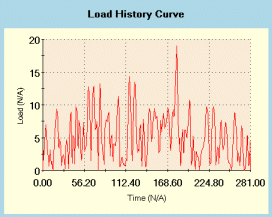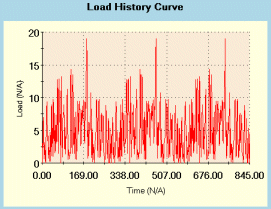The software handles two different types of fatigue events: constant amplitude and variable amplitude.
You can also define multiple fatigue events, and set the type of interaction between them to: no interaction or random interaction between events. The random interaction method is based on the ASME Boiler and Pressure Vessel Code. The software mixes peak stresses from different events to evaluate the alternating stress.
Constant Amplitude Events
All cycles of a constant amplitude event have the same alternating and mean stresses. A constant amplitude fatigue event is fully defined by an alternating stress, mean stress (or stress ratio), and the number of cycles.
A fatigue event can be based on:
- A single load case from a static study, or from a particular solution step of a nonlinear or modal time history dynamic study.
- Multiple load cases from static studies or from solution steps of a nonlinear or modal time history dynamic studies. In the case of multiple load cases, the software determines the load case combination that produces the largest stress fluctuation.
| Example of Constant Amplitude Event
|
|---|
 |
Variable Amplitude Events
A variable amplitude fatigue event is a load history record that defines the fluctuation history of a load. The time values do not play any role for fatigue studies with a single variable amplitude event. In this case, it is adequate to define the amplitude sequence. For studies with more than one variable amplitude fatigue events, time values are needed for each record to correlate to other loading events.
| Number of Repeats
|
|---|
  |